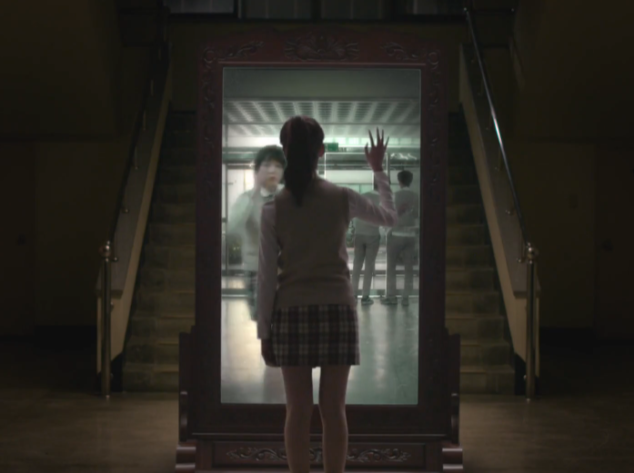Logic broke down when a bare-bodied male philosopher locked eyes with a little cat in a bathroom. That was the scene Jacques Derrida painted of himself alongside a meditation on how the cat was behind him since it was before him. But more precisely, Derrida was referring to the animal world in general and how animality surrounds and pervades humanity since it precedes the emergence of humanity. While he agreed that differences exist between animals and Homo sapiens, he challenged the common philosophical assumption of a sharp, singular distinction between the two. Something in this kind of attitude may also be warranted in other types of debates about the true face and ideal living conditions of the human race.
Over in the 2016 Korean web series Nightmare High, the psychological condition of teenage students is dissected as model student Kang Ye-rim and her camera-toting buddy Seo Sang-woo investigate their classmates’ mysterious disappearances from both physical reality and the collective memory. Apparently, each missing student has been lured into signing a contract for a magical item that fulfills his or her desire—of gaining popularity, winning fights, having imaginary admirers turn real, etc.—on the condition that he or she does not turn back on the decision. All end up trapped in nightmares and forgotten as the effects of the items—harassing admirers, endless calls for fights, and the like—backfire on them.
The enigmatic teacher behind the contracts eventually tempts Ye-rim into entering a nightmare herself to rescue her classmates. Realizing that nightmares can be dispelled by waking up, though, Ye-rim succeeds in returning to her original reality and bringing back everyone with her. In the process, she comes to terms with the murkier side of herself, which despises these classmates and might not have conformed to the ideals of school and society if not for her self-evasion. Impressed, the teacher tells her that he will stop initiating such activities and erases these memories from her and the rescued classmates. And so, Ye-rim wakes up to a happy, normal day in the classroom, where the only annoyance is the uncool photograph cheeky Sang-woo has just taken of the sleeping girl.
In the last scene, however, the audience is brought to the time the first contract was signed—for a camera that can divulge its subjects’ secrets, the risk of upsetting knowledge accepted by a discernibly serious boy whose name you are thinking of. Maybe the actual challenge issued by the show is this: are viewers ready to confront the potentially disturbing reality in their education system and wake up from it? And are conventional models of success obscuring young people’s true dreams and nature? Clearly, this latter question should be asked of adults too.
From certain vantage points, however, the hunt for nature is unnatural. In making this kind of artificiality-based distinction between humans on one hand and other living organisms and features of the earth on the other, Man mentally alienates his own race from the physical world, even though his origins and existence are rooted in it. Fundamental distinctions between him and other inhabitants of the earth do exist—in cognitive and moral aspects, yet even these are qualities he has come to possess partly as a result of the biological phenomenon of evolution. His efforts make up the other important source of those traits, but it is, again, his biological wiring that enables the efforts.
The same reasoning applies to the branding of man-made creations, cultural conditioning and conscious behavioral choices as “artificial.” It seems inconsistent to regard human architecture and inventions, including machines outsmarting humans, as such and termite mounds towering over five meters, complete with fungus farms within, as “natural” when both stem from the efforts of living beings. Human society and actions are similarly no less facets of ecological life than the ant caste system with its division of labor, frogs that fake deaths to escape predators eating only live prey, and zebra finches that fake health to attract mates. It may be argued that it is prejudice and convenience that have led us to regard the study of the former as the separate discipline of sociology.
The assumption that Man’s real self lies in some essence waiting to be uncovered from within himself is another fanciful notion. The spiritual core of Man, presumably constituted by his primitive instincts and yearnings from the innermost depths of his heart, may really be a hypothetical entity capable of standing alone only in our imagination. Stripped of his rational judgment, adaptive responses, personal packaging, culture and modern trappings, one would probably experience tremendous difficulties functioning in today’s world. Yet a being whose existence cannot be secured cannot have a place in reality for long. Even individuals devoid of mental capacity have survived only because of the “artificial” environment helpers surround them with. They do not live as unadorned versions of themselves, in a figurative sense. Moreover, actions and consequences are obviously no less real than the mind. However noble or base intentions are, behavior cannot be ignored. The inner selves we fantasize about have limited significance without the exteriors.
Unsurprisingly, then, existentialists have argued that the meaning of an individual’s existence is defined by his choices. Among them, Jean-Paul Sartre asserted that “Man is nothing else but what he makes of himself.” Taken alone, though, the implicit or potential implicit negation of all subjectivity to innate physiology (the other extreme of the core versus shell debate), interpersonal influence and the material world would have been a weakness of the statement. However, Sartre went on to muse that one’s actions set behavioral standards for humanity as a whole. Besides addressing the concern about interpersonal influence, this part of his argument inspires the notion that actions can mold consciousness. It would be another reason why the collective psyche of the human race cannot be considered in an isolated manner.
In addition, hunting or searching for something implies that the object already exists. Human nature, however, is not static. Evolution is an ongoing process. So are the cultural, economic and political shifts that, as inferable from the above discussion, modify our state of being. Yet another pertinent set of phenomena are epigenetic changes resulting from lifestyle modifications and environmental shifts. Observations linking exercise, prenatal nutrition and pollutants to changes in DNA methylation and histone modification patterns, which can result in altered levels of gene expression, interestingly counter myths of genetic determinism (i.e. the theory that the inherited DNA code per se dictates the person’s life) with genetic evidence itself. In this light, while history, literature and introspection are useful tools for understanding the human condition, such an understanding is woefully incomplete without prospective analyses.
All things considered, instead of simply invoking references to naturalness such as “authentic selves” and “unadulterated beauty” in discussions, it may help to state that we mean concealed thoughts, suppressed feelings, honest communication or (self-)understanding, comfortable qualities (as opposed to the Frankenstein Syndrome for bionic technologies, for instance), aspects of life we are for now evolutionarily more suited for, relatively stable components of ourselves that are not permanently modified by culture and circumstances, and so on. Such specificity may allow us to identify the precise roots of our unhappiness, instead of glossing over them with unrealistic visions of some kind of nature.
Cats know that there is nothing overwhelmingly touching about a philosopher without his clothes.







Special thanks to Tasty Eats Ronit Penso and
Tasty Eats Ronit Penso and  AESANTOS for their expression of support in the preview and to the following bloggers for responses to the temporary post “Passing the Baton …”:
AESANTOS for their expression of support in the preview and to the following bloggers for responses to the temporary post “Passing the Baton …”:
– theotheri
theotheri Cindy Knoke
Cindy Knoke Mitta
Mitta Tasty Eats Ronit Penso
Tasty Eats Ronit Penso Kay
Kay ladysighs
ladysighs Bernice
Bernice Clara
Clara
–
–
–
–
–
–
–
– Tumblr bloggers randomesfeve, looyoung, sixquatreneuf, lushstardust, thisistherealitythatiwanted, rhjart, elvenkingtranduil and shieldmaidenofyork
Fascinating to read this exploration of the question of humanity and our identity from within the context of literature. As I psychologist, I have spent my life exploring this question solely from within philosophical and scientific dimensions.
Terrific post.
As usual, thank you for your compliment! The idea of television drama as literature, if I am getting you correctly, is new to me. Maybe I am prejudiced myself towards television entertainment. Or maybe you were referring to Derrida’s account of his bathroom adventure? None of the arguments here are really based on television fiction or Derrida’s (philosophical) treatise, though.
I agree – “literature” is the wrong word. I was writing my reply rather late into the night and I grabbed the wrong description out of my weary brain. “Drama” might be closer to the mark. Or perhaps even more broadly “stories.” The point, as I think you understand, that I was trying to make was to distinguish between your starting point — human experience as opposed to philosophical or scientific assumptions and principles. In my aging years, I’m developing an increasingly deeper appreciation of the value of being rooted in experience and moving on from there, rather than beginning with principles. Both have their value and potential short-comings, though, and benefit from complementing rather than competing with each other.
For me, the great breath of fresh air you provide with this blog is your broad and sophisticated exploration of principles arising from and demonstrated through experience – whether real or fictional, whether presented on stage, in written form, or even on television — which isn’t always a lower form of entertainment, though it often does take a bit more scavenging to find it there.
Thank you for the clarification. I actually made a couple of mistakes in my reply. It should be “web drama” and maybe “on-screen entertainment.” It looks like I am still stuck in the old way of associating dramas with the television set!
I definitely agree with you that it takes more scavenging to explore principles through television/web dramas. It just happens to meet my objective of reducing prejudice toward Asian dramas and make the drama watching experience more rewarding for everyone. The dramas are the lemons, and this chair is the makeshift juice counter (for lack of a bench or table!). Dramas also give this site a distinct and memorable theme so that it does not feel like just another one of the millions of general opinion blogs out there.
The consolation is that web dramas seem to be more adventurous, unlike their television counterparts, which are probably more anxious about pleasing less sophisticated viewers, who still have television as part of their leisure routine but just want a quick entertainment fix and disdain complex plots. Nightmare High is not necessarily perfect in logic in my opinion, but its Inception-style motif at least gives viewers a mental workout.
Thank you too.